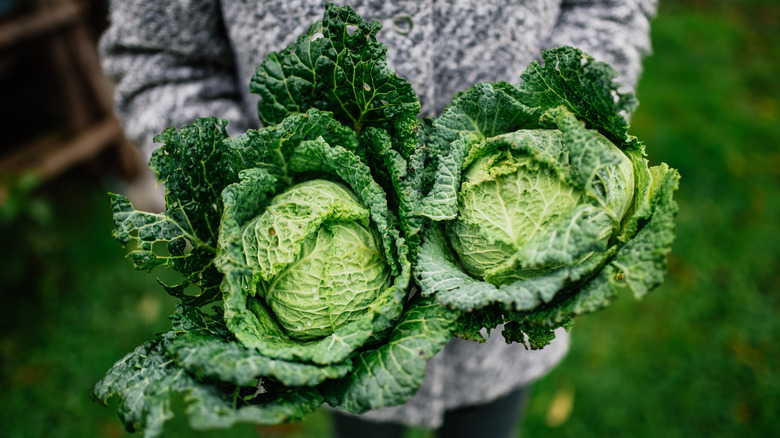You May Be Able To Thank The Ancient Celts For Cabbage
Cabbage is not often considered when it comes to at-home consumption. Sure, we've all tried sauerkraut before or had a restaurant prepare a nice cabbage salad that we promised ourselves we'd try to make but never did. It simply goes overlooked or is purposefully avoided thanks to the vegetable's sulfur compounds, which are released when overcooked (via Harvest to Table). It doesn't help that cabbage, on first inspection, is rather bland, with little but a leafy flavor and a crunchy texture. In reality, however, there are innumerable ways to utilize it. Food Timeline reports that cabbage has been a part of Irish, Russian, and German diets for centuries and has historically been prepared in several different ways, from pickling to braising.
The nutritional benefit of cabbage is also pretty remarkable. It is extremely rich in vitamins vital for the body's metabolism and nervous system to function (via Healthline). The bulbous vegetable is also high in fiber and antioxidants, which help prevent diseases and cell damage. With the sheer extent of its nutritional value and its easy preparation (you could literally eat this raw), it's no wonder the ancient people of Northern Europe loved to cultivate this particular plant.
The ancient Celts spread the cabbage gospel
Although the Romans are often credited for introducing cabbage to Europe, Food Timeline claims that there is evidence that the Iron Age Celts were already very familiar with the plant and its properties and may have influenced Roman opinion on the plant. The Celtic people are defined as those who lived in what is today the U.K. and Ireland during the Iron Age and through the post-Roman era (via Amgueddfa Cymru). Though it is believed by Aggie Horticulture that the Celts heavily consumed and helped to spread the consumption of cabbages throughout Europe, the vegetable itself actually originated in the eastern Mediterranean. But even though cabbage had roots in the Mediterranean, the Celt's affinity with the plant went on to affect the Latin word for cabbage "brassica," which comes from the Celtic word "bresic."
So, why might the Celts have had ancient knowledge about a Mediterranean vegetable? Well, Aggie Horticulture writes that the Celts invaded the Mediterranean and Asia Minor region sometime around 600 B.C., which gave the British Isles plenty of time to establish cabbage into their culture before the Romans invaded in A.D. 43. Odds are that the Celts then reintroduced the importance of cabbage to the Romans, who then spread the vegetable across their massive empire.

